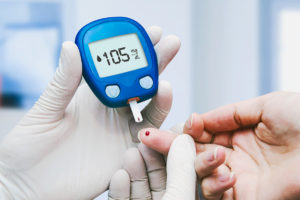Hernia repair has a low rate of complications during recovery. However, people with type 1 or 2 diabetes have a higher risk for adverse events, including bleeding, infection, and superficial wound dehiscence (where the wound splits or bursts open). November is American Diabetes Month, and Dr. Gregory Dumanian wants you to understand how diabetes can affect hernia surgery and how we can work together to lower complications.
Patients require incisional hernia repair to decrease the chance of bowel obstructions, help hernia pain, and to limit the bulging of abdominal tissues. Dr. Dumanian can discuss your concerns with diabetes and hernia repair and how to mitigate the increased risk of complications.
Research on Diabetes and Hernia Repair Complications
It is recommended that patients with diabetes maintain blood sugar concentrations between 100 and 180mg/dL, though some organizations say up to 200mg/dL is allowed. A 2023 study published in JAMA Network Open investigated the theory that poor glycemic control on the day of hernia surgery may lead to higher operative complications. Researchers analyzed the results of 13,100 hernia procedures at 137 Veterans Health Administration facilities. They found that patients with high blood sugar (hyperglycemia) levels on the same day of their hernia surgery experienced more adverse events during recovery. However, the complication rate was still low at 2.6%. Researchers also discovered that low blood sugar (hypoglycemia) on the day of surgery did not increase risks. This study was limited by the patient pool, which primarily consisted of white males. Many surgeons write that the severity of an infection complication, when it occurs, can be worse in diabetic patients as opposed to non-diabetic patients.
Another study published in the Annals of the Royal College of Surgeons of England focused on women with diabetes and the rate of reoccurring hernias after laparoscopic hernia repair. They determined that patients with diabetes have a higher risk of infection in the surgical site, whether the repair is done through open surgery or a laparoscope. Having diabetes increases the risk of the hernia returning, and the higher infection rates among patients with diabetes can lead to incisional hernias.
Reducing the Risk of Hernia Repair Complications in Patients with Diabetes
Diabetic management is key to reducing your risk of complications after hernia repair and improving your overall health. Controlling blood sugar and keeping it within the recommended range can prevent diabetes from damaging your tissues and may lower the risks of hernia surgery. Weight loss, also an important issue for decreasing hernia complications, may go hand in hand with improved diabetes control.
The Centers for Disease Control (CDC) recommends taking measures to improve glycemic control and lower blood sugar levels before surgery. These may include medication changes and lifestyle modifications, such as increasing exercise and improving your diet. The CDC and many healthcare organizations recognize the risk factors for patients with diabetes and recommend improving disease management for a safer hernia repair. These organizations advise patients to have blood sugar levels below 200mg/dL before hernia surgery to lower the risk of surgical site infections. The American Diabetes Association, the Endocrine Society, and the Society for Ambulatory Anesthesia recommend testing for improved glycemic control before hernia surgery.
Schedule a consultation at Northwestern Plastic Surgery to discuss your hernia repair with Dr. Dumanian. Contact our Chicago, Illinois, office at (312) 695-6022.


